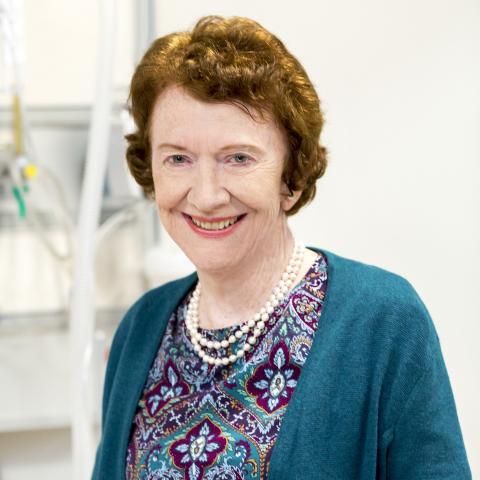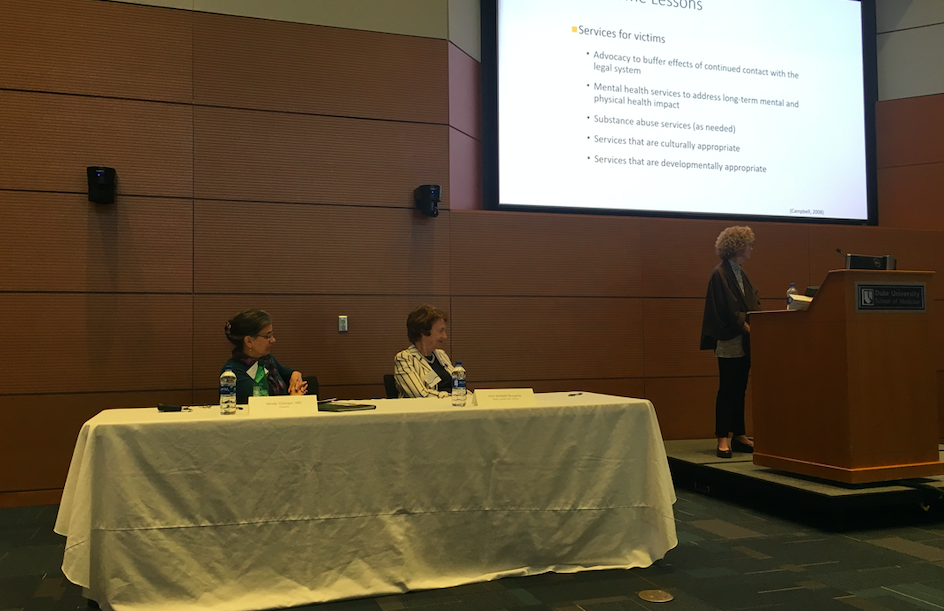One of the first things I was told during freshman orientation was that two out of every five young women at Duke experience some form of sexual assault during their four years as an undergraduate. Shortly after that, I was informed that as a Duke student, I was not allowed to protect myself with pepper spray, because it is banned by university policy.
At the 2019 Harriet Cook Carter Lecture, Ann Burgess, a professor of psychiatric mental health nursing at Boston College, reported that 25 to 30 percent of women and 10 percent of men will be sexually assaulted in their lifetimes, statistics that make our campus standard of 40 percent seem strikingly high in comparison. Burgess has devoted her life to the support of sexual assault survivors, and pioneered treatments for victims of such abuse. For the past fifty years, she has studied the traumatic effects of rape and violence on patients of all ages, and worked closely with the FBI Academy to research the underlying causes of such crimes. Her work at the FBI was so impactful, Netflix decided to write a TV series about her, a crime drama called “Mindhunter.” Talk about a powerful woman.

When she began her work with rape survivors in the 1970s, the world was a very different place. Public attitudes towards sexual assault were unsupportive and disapproving of victims. Rape thrived on prudery, silence, and misunderstanding. There were very few reported cases, low conviction rates of criminals, and plenty of victim blaming. “We just didn’t talk about these kinds of things,” Burgess recalled. “There was no public recognition.”
So have we advanced? Yes, absolutely. Throughout the years, Burgess says she has seen a crucial shift towards more support for survivors. She has helped the FBI develop better systems for criminal profiling, and testified countless times in court to ensure justice for survivors of all ages. Burgess has witnessed these court cases changing policies, and affecting the genesis of laws that will better protect citizens against rape and other violent crimes. She has studied lasting trauma in survivors, and used this research to implement new culturally and developmentally appropriate services for victims. She believes that, as a society, we are doing a much better job today to reduce stigma and support survivors, but that the work is not even close to finished.
Sexual assault is still an intensely pervasive issue in society. Rape can happen anywhere, to anyone, and Burgess thinks it all boils down to the cultural emphasis on aggression. “We’ve all become complacent to the violence in the world that we live in,” as panelist Lynden Harris put it. As a society, we perpetuate aggressive masculinity, often without even realizing it. And especially in communities like the military, where women and men alike are highly regulated and taught to avoid showing weakness at all costs, the stigma surrounding sexual assault is intense. Commander Alana Burden-Huber, director of public health services at the Cherry Point Naval Health Clinic, shared her perspective that it can be very difficult to come forward in such a world of conformity. She also mentioned that female jurors in sexual assault cases tend to be much harsher on female survivors than male jurors, and attributes this to the fact that female members of the military are constantly trying to be harder and more stoic, so as to parallel military men.

Panelist Mindy Oshrain, a consulting associate in the Duke Department of Psychiatry, quieted the crowd by sharing a moving quote from Maya Angelou: “There is no greater agony than bearing an untold story inside of you.” She reminded us that it is so important to listen to patients, and slow down enough to ask someone multiple times if they are doing okay. It is easy to forget this at a place like Duke, where we are all constantly moving 100 miles a minute, checking boxes as we rush from one activity to the next, but it can make all the difference to stop, and take the time to ask again- How are you really doing? What can I do to support you? Empathy has the power to change the world.
As a sophomore, I now live in a building full of young women on the edge of Central Campus, on a street that is only serviced by Duke transportation in one direction. Just a few months ago, I woke up to a Duke Alert message on my phone, which informed me that a violent rape crime had occurred in the night, just fifty yards from my apartment. While we may have come a long way since the 1970s, the unavoidable fact remains that as young women living in this world, we are not safe. Let’s change that.

